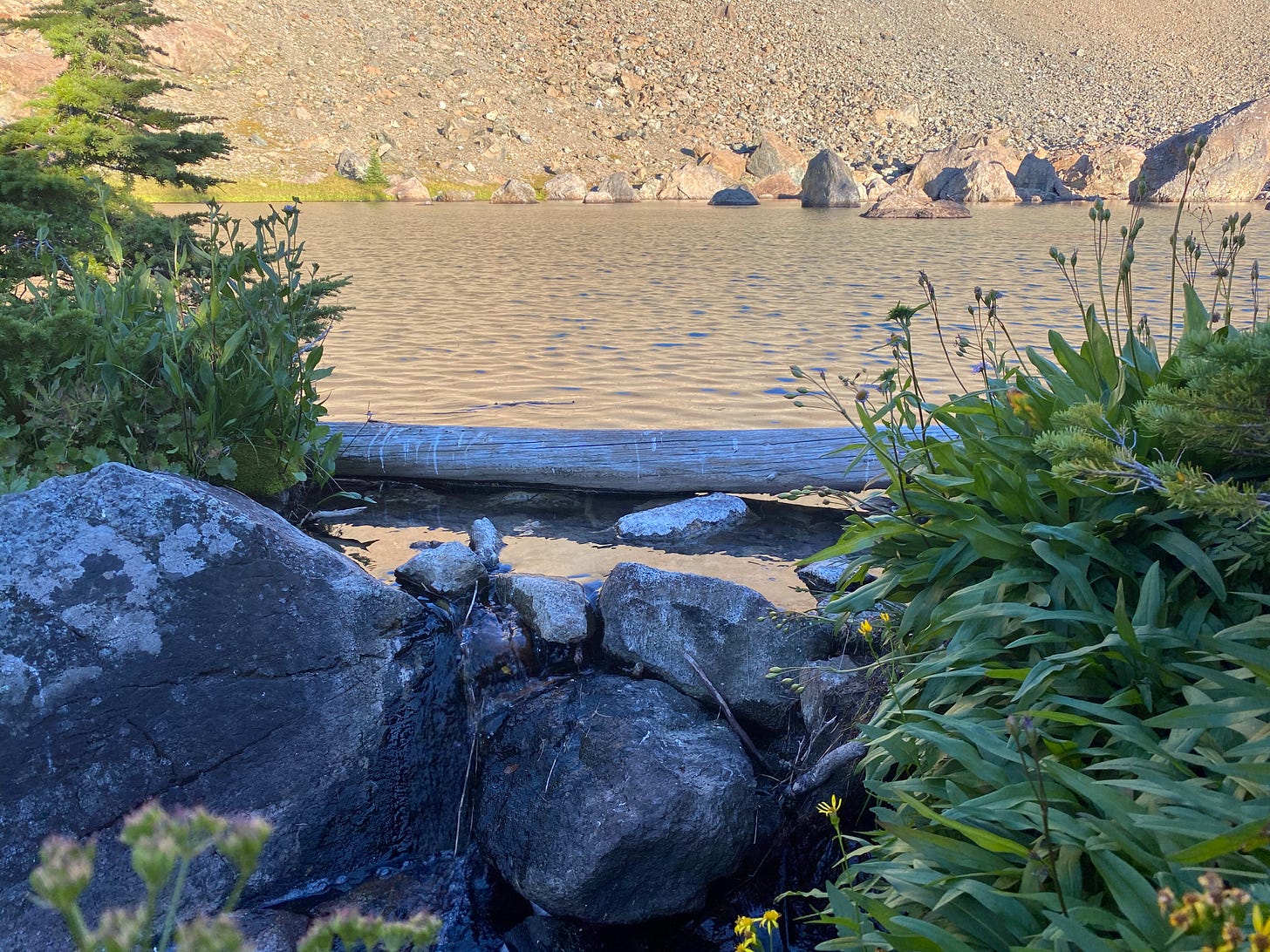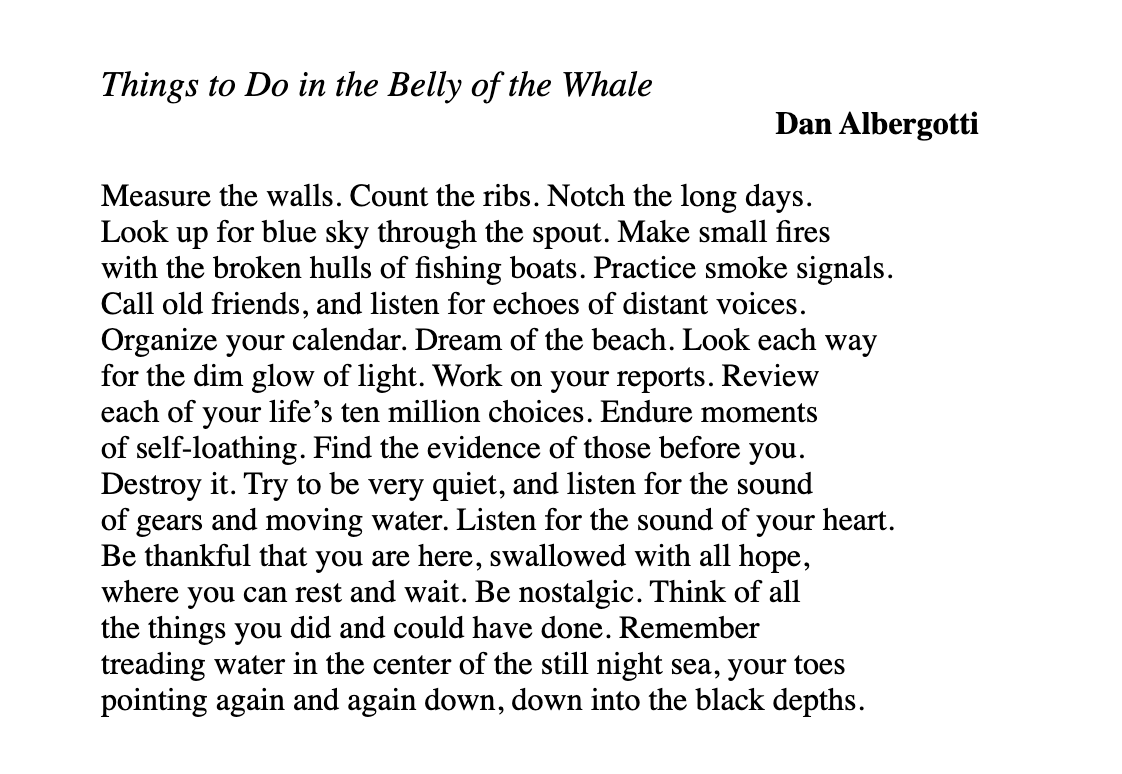Remember Treading Water In The Center Of The Still Night Sea
On willingly entering the belly of the whale.

There are obviously a lot of pressing things going on in the world right now, but if you, like me, use reading as an escape, I have a book out that might interest you about my thru-hike of the Pacific Crest Trail.
I’ve shied away from writing about politics lately and thrown myself back into writing and thinking about nature. I think this is in large part because I’ve got so much energy invested in a particular struggle in my union right now that the last thing I want to do is write about politics when I’m off that clock. On top of that I’ve gone backpacking three times in the past month, which never fails to drag the romantic in me back to the surface and quash my interest in more material struggles. There is also the complication that James Baldwin lays out so neatly here:

So it’s occasionally a challenge to put much meaning on the page. But these—like all others—are political times, and it’s impossible to stay away for long. On Monday afternoon, lazing around in what passes for sweltering heat in Seattle, the bleak weight of everything we’re facing settled onto me so thoroughly that I felt pinned to the couch. At this point you know the players and the problems (another reason I have to stop writing about politics every so often: how many times can you name the same crises before it becomes mindlessly uninteresting?), and god, is it hard to see just how ill-equipped the Democratic Party is to rise to this moment. Even that might be giving them too much credit, as it implies that they are actually interested in winning or governing; it seems clear to me that they would rather play #Resistance for another four years of Trump than even glance at a single tepid social-democratic reform.
These are clearly the signs of a healthy and functioning opposition party, yessir. That the average liberal pundit still hates Ralph Nader for “giving us” George W. Bush but will gladly elevate his Iraq War conspirators as fellow travelers would be hilarious if the consequences weren’t so dire.
When the national scene gets especially bleak it makes sense to turn some of your attention locally, so I’ve been trying to do that. I mentioned that union issue earlier. Basically, the community college district where I teach is preemptively trying to enact sweeping cuts, program closures, furloughs, and layoffs in advance of next year’s projected state budget crisis. Austerity measures, in other words. The district’s “Equity, Diversity, and Inclusion” focus for the school year is risible when you consider who will bear the brunt of these cuts—students, part-time and low-ranking faculty, custodians, IT people, and so on. Your guesses about the demographics of those groups as compared to the group that will stay afloat through all this would be largely correct.

A question I have cause to ask myself on a daily basis: what are you going to do about that? And I’m fortunate enough to be part of a union, where that question isn’t for me alone to answer. Honestly, the answer is pretty simple: you talk to people, you find out what they care about, and you find out what they’re willing to risk to stop bad things from happening. Then you organize them into action. (Unfortunately, it’s the doing all of that that’s the hard part.) Since the pandemic started I’ve had four or five non-union friends reach out to me about what they can do to make things better in their own workplaces, and the first question I ask them is also a simple one: how many of your coworkers’ phone numbers do you have right now? From there the path gets clearer. You can’t make things better at work if you don’t know and trust the people you work with—and even the act of coming up with a reason to ask for a coworker’s number can go a long way.
Last week I had the privilege of talking to Ellen David Friedman, a longtime organizer of educators, and she said something simple that has stuck with me ever since. What she said was this:
A demand without a threat is a request. Does it feel like your bosses are in the business of giving in to requests?
The answer, obviously, is “no.” Which brings us back to the task of organizing other people around that idea. But it’s hard to get people to take action, because they’re understandably afraid of the consequences, or they’re just insulated enough from the worst of it not to be bothered, or because a religious belief in the power of the individual still reigns, or or or…

So: it’s heavy, all of this, and it is very easy to internalize it. That you aren’t doing enough, fighting hard enough, that you’ll never beat these sickos, that your responsibility to other people is enormous and you’re failing them at every turn. I came across a phrase the other day that I think sums this—as well as my aforementioned frustrations over the freshness of my writing material—up pretty well.
I realized that for years, I have been marking the people I love as suspects in the case of my own self-hatred.
That comes from another Substack newsletter, one by the political writer Emma Roller, who has bylines in all the usual impressive places. (People who occasionally appear in The New York Times—they’re just like us!)
Roller continues:
I’ve been acting as judge, jury and executioner in trials that the people I care about don’t know exist, with the same result applied to myself every time: guilty, guilty, guilty.
The moment of clarity and self-awareness this elicited in me was almost painful. And it reminded me to uncover the half-hidden note on my writing desk’s corkboard, one I borrowed from Infinite Jest a few years ago:
You will become way less concerned with what other people think of you when you realize how seldom they do.
Some necessary—and liberating—humble pie, there. And of course you can’t always be in motion. You can’t always be scheming, acting, winning. Sometimes it’s just as important to do nothing but take stock, bear witness, and heal.

I’m headed back to Upstate New York to be with family for a few weeks, possibly my only chance to see any of them in 2020. It’s not the belly of the whale but I aim to make it as quiet and contemplative as I can.
Talk to you next week (from the other side of the country).
-Chuck
PS- If you liked what you read here, why not subscribe? It’s free and always will be, and you’ll get it right in your inbox every Wednesday.


